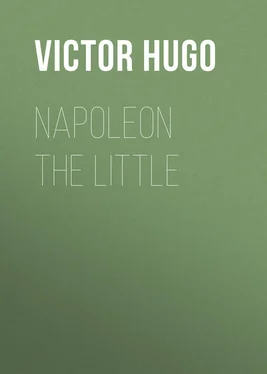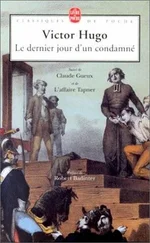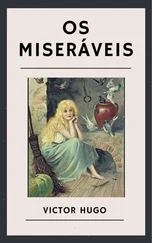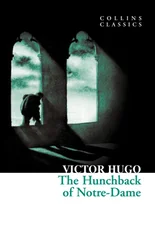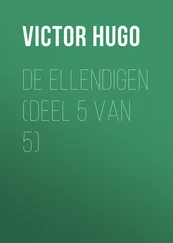Victor Hugo - Napoleon the Little
Здесь есть возможность читать онлайн «Victor Hugo - Napoleon the Little» — ознакомительный отрывок электронной книги совершенно бесплатно, а после прочтения отрывка купить полную версию. В некоторых случаях можно слушать аудио, скачать через торрент в формате fb2 и присутствует краткое содержание. Жанр: literature_19, foreign_antique, foreign_prose, на английском языке. Описание произведения, (предисловие) а так же отзывы посетителей доступны на портале библиотеки ЛибКат.
- Название:Napoleon the Little
- Автор:
- Жанр:
- Год:неизвестен
- ISBN:нет данных
- Рейтинг книги:3 / 5. Голосов: 1
-
Избранное:Добавить в избранное
- Отзывы:
-
Ваша оценка:
- 60
- 1
- 2
- 3
- 4
- 5
Napoleon the Little: краткое содержание, описание и аннотация
Предлагаем к чтению аннотацию, описание, краткое содержание или предисловие (зависит от того, что написал сам автор книги «Napoleon the Little»). Если вы не нашли необходимую информацию о книге — напишите в комментариях, мы постараемся отыскать её.
Napoleon the Little — читать онлайн ознакомительный отрывок
Ниже представлен текст книги, разбитый по страницам. Система сохранения места последней прочитанной страницы, позволяет с удобством читать онлайн бесплатно книгу «Napoleon the Little», без необходимости каждый раз заново искать на чём Вы остановились. Поставьте закладку, и сможете в любой момент перейти на страницу, на которой закончили чтение.
Интервал:
Закладка:
"Now that, elected by universal France, I am become the legitimate head of this great nation, I cannot pride myself on a captivity which was occasioned by an attack upon a regular government .
"When one has observed the enormous evils which even the most righteous revolutions bring in their train, one can scarcely comprehend one's audacity in having chosen to take upon one's self the terrible responsibility of a change ; I do not, therefore, complain of having expiated here, by an imprisonment of six years, my rash defiance of the laws of my country , and it is with joy that, in the very scene of my sufferings, I propose to you a toast in honour of those who, notwithstanding their convictions, are resolute to respect the institutions of their country ."
All the while he was saying this, he retained in the depths of his heart, as he has since proved, after his fashion, that thought which he had written in that same prison of Ham: "Great enterprises seldom succeed at the first attempt." 10 10 Historical Fragments.
Towards the middle of November, 1851, Representative F – , a frequenter of the Élysée, was dining with M. Bonaparte.
"What do they say in Paris, and in the Assembly?" asked the President of the representative.
"Oh, prince!"
"Well?"
"They are still talking."
"About what?"
"About the coup d'état ."
"And the Assembly believes in it?"
"A little, prince."
"And you?"
"I – oh, not at all."
Louis Bonaparte earnestly grasped M. F – 's hands, and said to him with feeling:
"I thank you, M. F – , you, at least, do not think me a scoundrel."
This happened a fortnight before December 2. At that time, and indeed, at that very moment, according to the admission of Maupas the confederate, Mazas was being made ready.
Cash: that is M. Bonaparte's other source of strength.
Let us take the facts, judicially proved by the trials at Strasburg and Boulogne.
At Strasburg, on October 30, 1836, Colonel Vaudrey, an accomplice of M. Bonaparte, commissioned the quartermasters of the 4th Regiment of artillery, "to distribute among the cannoneers of each battery, two pieces of gold."
On the 5th of August, 1840, in the steamboat he had freighted, the Ville d'Edimbourg , while at sea, M. Bonaparte called about him the sixty poor devils, his domestics, whom he had deceived into accompanying him by telling them he was going to Hamburg on a pleasure excursion, harangued them from the roof of one of his carriages fastened on the deck, declared his project, tossed them their disguise as soldiers, gave each of them a hundred francs, and then set them drinking. A little drunkenness does not damage great enterprises. "I saw," said the witness Hobbs, the under-steward, before the Court of Peers, 11 11 Court of Peers, Depositions of witnesses , p. 94.
"I saw in the cabin a great quantity of money. The passengers appeared to me to be reading printed papers; they passed all the night drinking and eating. I did nothing else but uncork bottles, and serve food." Next came the captain. The magistrate asked Captain Crow: "Did you see the passengers drink?" – Crow: "To excess; I never saw anything like it." 12 12 Court of Peers, Depositions of witnesses , pp. 71, 81, 88, 94.
They landed, and were met by the custom-house officers of Vimereux. M. Louis Bonaparte began proceedings, by offering the lieutenant of the guard a pension of 1,200 francs. The magistrate: "Did you not offer the commandant of the station a sum of money if he would march with you?" – The Prince: "I caused it to be offered him, but he refused it." 13 13 Court of Peers, Cross examination of the accused , p. 13.
They arrived at Boulogne. His aides-de-camp – he had some already – wore, hanging from their necks, tin cases full of gold pieces. Others came next with bags of small coins in their hands. 14 14 Court of Peers, Depositions of witnesses , pp. 103, 185, etc.
Then they threw money to the fishermen and the peasants, inviting them to cry: "Long live the Emperor!" – "Three hundred loud-mouthed knaves will do the thing," had written one of the conspirators. 15 15 The President: Prisoner Querelles, these children that cried out, are not they the three hundred loud-mouthed knaves that you asked for in your letter? – (Trial at Strasburg.
Louis Bonaparte approached the 42nd, quartered at Boulogne.
He said to the voltigeur Georges Koehly: " I am Napoleon ; you shall have promotion, decorations." He said to the voltigeur Antoine Gendre: " I am the son of Napoleon ; we are going to the Hôtel du Nord to order a dinner for you and me." He said to the voltigeur Jean Meyer: " You shall be well paid. " He said to the voltigeur Joseph Mény: " You must come to Paris; you shall be well paid. " 16 16 Court of Peers, Depositions of witnesses , pp. 142, 143, 155, 156, 158.
An officer at his side held in his hand his hat full of five-franc pieces, which he distributed among the lookers-on, saying: " Shout, Long live the Emperor! "
The grenadier Geoffroy, in his evidence, characterises in these words the attempt made on his mess by an officer and a sergeant who were in the plot: "The sergeant had a bottle in his hand, and the officer a sabre." In these few words is the whole 2nd of December.
Let us proceed: —
"Next day, June 17, the commandant, Mésonan, who I thought had gone, entered my room, announced by my aide-de-camp. I said to him, 'Commandant, I thought you were gone!' – 'No, general, I am not gone. I have a letter to give you.' – 'A letter? And from whom?' – 'Read it, general.'
"I asked him to take a seat; I took the letter, but as I was opening it, I saw that the address was — à M. le Commandant Mésonan . I said to him: 'But, my dear Commandant, this is for you, not for me.' – 'Read it, General!' – I opened the letter and read thus: —
"'My dear Commandant, it is most essential that you should immediately see the general in question; you know he is a man of resolution, on whom one may rely. You know also that he is a man whom I have put down to be one day a marshal of France. You will offer him, from me, 100,000 francs ; and you will ask him into what banker's or notary's hands I shall pay 300,000 francs for him, in the event of his losing his command.'
"I stopped here, overcome with indignation; I turned over the leaf, and I saw that the letter was signed, 'Louis Napoleon.'
"I handed the letter back to the commandant, saying that it was a ridiculous and abortive affair."
Who speaks thus? General Magnan. Where? In the open Court of Peers. Before whom? Who is the man seated on the prisoners' bench, the man whom Magnan covers with "scorn," the man towards whom Magnan turns his "indignant" face? Louis Bonaparte.
Money, and with money gross debauchery: such were his means of action in his three enterprises at Strasburg, at Boulogne, at Paris. Two failures and a success. Magnan, who refused at Boulogne, sold himself at Paris. If Louis Bonaparte had been defeated on the 2nd of December, just as there were found on him, at Boulogne, the 500,000 francs he had brought from London, so there would have been found at the Élysée, the twenty-five millions taken from the Bank.
There has, then, been in France, – one must needs speak of these things coolly, – in France, that land of the sword, that land of cavaliers, the land of Hoche, of Drouot, and of Bayard – there has been a day, when a man, surrounded by five or six political sharpers, experts in ambuscades, and grooms of coups d'état , lolling in a gilded office, his feet on the fire-dogs, a cigar in his mouth, placed a price upon military honour, weighed it in the scales like a commodity, a thing buyable and sellable, put down the general at a million, the private at a louis, and said of the conscience of the French army: "That is worth so much."
Читать дальшеИнтервал:
Закладка:
Похожие книги на «Napoleon the Little»
Представляем Вашему вниманию похожие книги на «Napoleon the Little» списком для выбора. Мы отобрали схожую по названию и смыслу литературу в надежде предоставить читателям больше вариантов отыскать новые, интересные, ещё непрочитанные произведения.
Обсуждение, отзывы о книге «Napoleon the Little» и просто собственные мнения читателей. Оставьте ваши комментарии, напишите, что Вы думаете о произведении, его смысле или главных героях. Укажите что конкретно понравилось, а что нет, и почему Вы так считаете.
